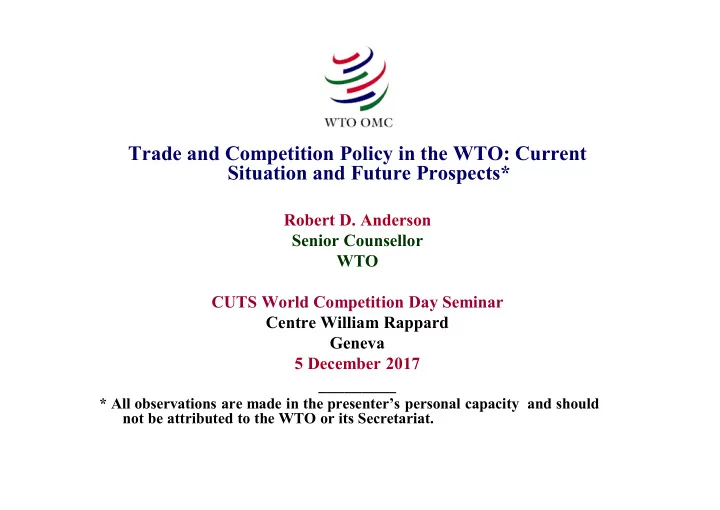

Trade and Competition Policy in the WTO: Current Situation and Future Prospects* Robert D. Anderson Senior Counsellor WTO CUTS World Competition Day Seminar Centre William Rappard Geneva 5 December 2017 _________ * All observations are made in the presenter’s personal capacity and should not be attributed to the WTO or its Secretariat.
Current status of work on competition policy in the WTO (1) Exploratory work programme commenced at Singapore Ministerial Conference (December 1996). Doha Ministerial Declaration (para. 23): recognized “case for a multilateral framework” and directed Members to develop “modalities for negotiations”. Subsequently, negotiations opposed by developing countries (key developed jurisdictions also had mixed feelings). No consensus reached on modalities at Cancun. July 2004 General Council Decision on the Doha Work Programme: no further work toward negotiations on competition policy (or investment or transparency in government procurement) for duration of the Doha Round.
Current status of work on competition policy in the WTO (2) In the meantime: very extensive capacity building work (CUTS, UNCTAD, OECD, etc.) AND incorporation of competition disciplines in RTAs (including TPP). Strengthening of inter-agency co-operation e.g. in the International Competition Network (ICN) and through bilateral enforcement agreements. Important focus on competition policy in work of international think tanks and business circles (see current work of the E15 Expert Group). Issue to re-emerge at WTO in the post-Buenos Aires environment?
Additional points for reflection Competition law/policy increasingly important as an instrument of economic governance More than 130 countries now have such laws Key instrument of economic integration (e.g. in EU/many RTAs). Interface with intellectual property, standards and the “new economy” and potential for international conflicts Relevance of sectoral perspectives, e.g. regarding: Services Intellectual property Government procurement Primary products and food Potential convergence of consumer and producer interests?
Key elements of the competition chapter of the Trans-Pacific Partnership (TPP) Agreement Requirement to adopt/maintain a competition law to address anti- competitive conduct, with objective of economic efficiency and consumer welfare. Requirements for procedural fairness and transparency in the enforcement of competition law. Independent private rights of action to enforce the law. Cooperation with other parties’ competition agencies in enforcing the law, and technical cooperation (capacity building). Right to consultations with other parties. NB: note also the separate substantive chapter on state-owned enterprises, including government monopolies.
Options for the future Continued reliance on FTAs/voluntary inter-agency agreements to promote intergovernmental cooperation in this area? Resumption of work in the WTO Working Group, possibly with direct “feed-in” from ICN? Negotiation of a multilateral framework as envisioned in the original Doha Ministerial Declaration? Possibly through “multilateralization” or “plurilateralization” of the TPP or other FTA approach?
Recommend
More recommend